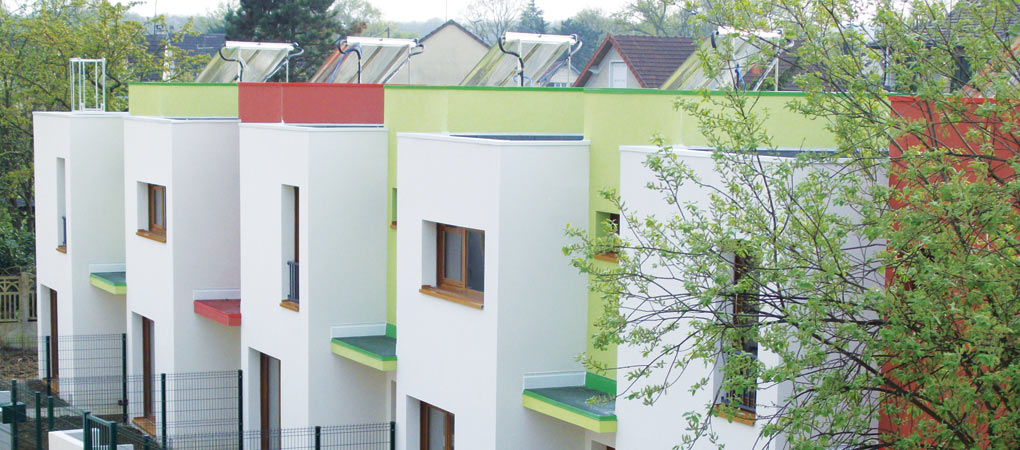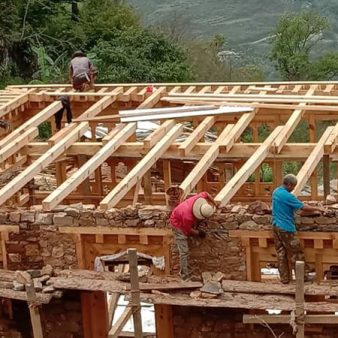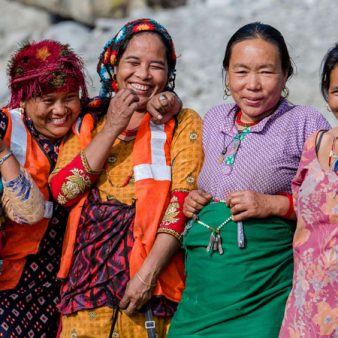The IGLOO France association works to support local organisations involved in the field of housing and socioeconomic integration to implement participatory housing processes involving very marginalised households. The approach enables vulnerable individuals, families and groups of families to obtain adequate and affordable housing (either through rental or affordable property ownership schemes), to acquire the necessary skills and self-esteem to seek employment, and to be reintegrated into the broader society. As of December 2011, 400 homes had been built or renovated, significantly improving the housing conditions of 850 vulnerable persons, and 65 per cent of households had at least one member in permanent or temporary employment.
Project Description
Aims and Objectives
- To improve the housing conditions of very marginalised households, encouraging their participation in the renovation or construction of their own homes whilst working to facilitate their return to work, their sense of dignity and their social reintegration.
- To provide local actors with a flexible methodology which allows them to address the housing and socioeconomic integration needs of very marginalised populations in their localities.
Context
The IGLOO approach targets extremely vulnerable populations facing a range of social, financial and housing difficulties. Some of the issues faced by the households reached through the programme include:
- Inadequate housing conditions, e.g. living in emergency accommodation or in caravans (35 per cent of those reached) or on abandoned sites; situations of overcrowding or forced cohabitation (22 per cent); insecure tenure (7 per cent were under threat of eviction), etc.
- Social difficulties, e.g. lack of qualifications and illiteracy, health issues (15 per cent), behavioural issues (e.g. alcohol, violence), discrimination (e.g. Roma, travellers and migrant households), etc.
- Financial difficulties, e.g. lack of (or insufficient) income (25 per cent of households were without income and 49 per cent were living on social benefits) and heavy indebtedness.
The people reached through the programme are significantly excluded from mainstream society, and are unable to secure accommodation through conventional social housing or to seek conventional forms of employment.
Key Features
IGLOO France was established in 1997 by representatives of social housing federations, social integration actors and trade union representatives, and became an association with the corresponding legal status in 2008. It comprises member individuals and organisations involved in the field of housing and socioeconomic integration, and functions through the work of members of staff from these member organizations who are made available to support the programme on a voluntary basis.
The IGLOO approach was elaborated by IGLOO France in order to jointly tackle the acute housing and socioeconomic needs of significantly marginalised populations. It focuses on the participation of marginalised individuals, families or groups of families and on the provision of ongoing social support and vocational training throughout the housing process. At the design stage, members of these households work with social workers and architects in order to develop suitable housing solutions. During the construction or renovation phase, they are involved via placements in construction companies or Work Integration Social Enterprises, or via apprenticeship schemes, in exchange for a monthly salary. They also participate in the interior design and maintenance of their accommodation.
The housing process therefore represents a means to obtain adequate and affordable housing, and to acquire hands-on skills in the construction industry, as well as crucial life skills and an enhanced sense of self-esteem, thereby facilitating marginalised individuals’ return to employment and their reintegration into the broader society.
The IGLOO France association acts as a platform for disseminating the IGLOO approach on a nation-wide scale, through the organisation of and participation in various seminars, events and working groups, and through publications. It also acts as a direct facilitator for the implementation of the IGLOO approach on the ground. Local projects are initiated when potential residents are identified either by an IGLOO member (who then builds the capacity of local actors) or by a local actor (who then approaches IGLOO-France for support). In both cases, the role of IGLOO France is to provide social and technical support, social capital (partnerships), and expertise in designing, implementing and running IGLOO projects. Actors involved in IGLOO projects include all levels of government; social housing bodies acting as project managers and social landlords or affordable mortgage providers; associations and professional support organizations providing social and vocational support; and construction companies, involved in the physical work and providing work experience to residents.
The core principles of the IGLOO approach – the focus on vulnerable and excluded households, on their socioeconomic reintegration and on affordable housing options – are applied in all projects. The actual housing solutions developed are however diverse as they respond to the specific circumstances of each household. IGLOO projects can take place in urban, peri-urban or rural areas. They can encompass a single housing unit, a group of individual houses or shared buildings, and can even be part of broader regeneration schemes. They include new build housing projects (60 per cent of projects) or rehabilitation projects (40 per cent). They can either provide rental solutions (70 per cent of the projects) or access to affordable property ownership (30 per cent).
How is it funded?
The core costs of running the IGLOO France association, amounting to US$49,815 per year, are covered by members’ contributions. The construction or renovation costs of each local project are covered through a variety of public subsidies from various levels of government and subsidised housing loans (e.g. PLA-I loans from the Caisse des Depots, a national bank). Land can be donated, acquired at market prices or made available via long-term leases. Ongoing social and vocational support is funded through public funding mechanisms for social support and welfare provision and through private donors such as the Abbe Pierre Foundation.
Why is it innovative?
- The IGLOO approach focuses on significantly marginalised populations, jointly tackling the lack of adequate housing, the lack of employment and qualifications, and deep forms of social exclusion.
- The in-depth involvement of vulnerable residents is innovative in the context of affordable housing provision in France.
- The housing solutions developed, whether through rental schemes or access to property ownership schemes, are affordable to populations for whom even conventional social housing is out of reach.
- The approach represents a flexible tool for socioeconomic integration and housing provision that various actors can mobilise and adapt to their own contexts.
What is the environmental impact?
Many IGLOO projects use sustainable building materials such as earth and locally-sourced timber. Some are renovation projects, using existing buildings as a starting point for the physical intervention.
All IGLOO projects are energy efficient and contribute to reduce fuel poverty (e.g. high levels of insulation, use of renewable energy etc). Many include other environmental features such as rainwater harvesting systems, green roofs etc. The IGLOO France association runs a thematic working group dealing with issues of environmental sustainability and fuel poverty.
Some IGLOO projects are part of broader regeneration initiatives and contribute towards the transformation of impoverished areas. Others involve the re-use of vacant land or empty properties for residential purposes.
Is it financially sustainable?
The strengthening of marginalised individuals’ professional skills and their return to employment are key goals of the IGLOO approach, through placements or apprenticeship schemes, as well as through vocational training throughout the housing process. As of December 2011, 38 per cent of the households involved in IGLOO projects had one member permanently employed. In total, 65 per cent of these households had one member employed, when including flexible and temporary forms of employment.
The IGLOO approach increases housing affordability for very low-income populations. Local projects mobilise a wide range of funds, which ensures very low rents and affordable property ownership schemes. In the case of rental projects, the maximum rent for a 50m² dwelling amounts to US$261 per month, as compared to an average rent of US$359 per month for a conventional social housing unit of the same size. Rents are entirely or almost entirely covered by residents’ main housing allowance. Homeownership is also made affordable through social housing bodies acting as subsidised mortgage providers, tailoring financial products to residents’ repayment capacities.
IGLOO France runs a working group to explore issues of affordable access to property ownership for very low-income populations.
Whilst IGLOO projects rely significantly on public funding, it is unlikely that these funding streams will cease in the future.
What is the social impact?
IGLOO projects jointly tackle multiple forms of exclusion. Through these projects, marginalised individuals are able to obtain suitable, safe and affordable housing. They acquire an enhanced sense of self-esteem and enhanced life skills. They furthermore develop professional skills and can acquire recognised qualifications, enhancing their ability to find employment.
In some IGLOO projects, the involvement of groups of households working together in the construction or renovation of several housing units helps to foster solidarity and cooperation amongst these households. Other IGLOO projects aim at raising the awareness of neighbours regarding the conditions of excluded IGLOO participants, helping to contribute to broader community integration.
Overall, the IGLOO approach empowers marginalised individuals to act as partners in transforming their housing conditions and the broader environment, and to play an active role in the society in the long term by fostering their return to work. Young people, women and elderly persons participate in IGLOO projects, in accordance with their personal capacities.
Barriers
- Implementing an IGLOO project can take up to two years as it requires complex partnerships and the involvement of very vulnerable households. During these two years, social housing partners are committed to providing temporary accommodation to future residents, or emergency improvements are made to their existing accommodation.
- Relevant actors need to be convinced of the effectiveness of the IGLOO approach. Sharing knowledge, showcasing achievements and raising the awareness of actors on the ground has proved crucial in this respect.
Lessons Learned
- It is always possible to find innovative ways to develop affordable housing solutions for very vulnerable populations, by mobilising existing funding mechanisms and building strategic partnerships.
- Vulnerable households’ participation in the housing process enhances their sense of ownership regarding their future homes, and it has the potential to increase their sense of dignity and to trigger their reintegration into society.
Evaluation
Actors involved in implementing an IGLOO project systematically monitor the progress of the households and meet regularly in order to raise any challenges faced. Projects are visited by IGLOO France representatives during their implementation and one year after completion. A comprehensive evaluation was conducted in 2006 involving 70 households, after which a detailed report was compiled to highlight the contribution of the IGLOO approach to the socioeconomic reintegration of residents.
Transfer
The IGLOO approach was initially piloted in three French regions and has subsequently been adopted by housing and socioeconomic integration actors in various French localities, as a flexible methodology responding to marginalised populations’ specific circumstances. Between 1998 and 2007, 280 IGLOO projects had been completed, improving the living conditions of 560 individuals, increasing to 400 (involving 850 individuals) by December 2011. Whilst the majority of IGLOO projects were initially rural, an increasing number of urban and peri-urban IGLOO projects are currently being implemented.
IGLOO France participates in and organises seminars, lectures, events and workshops, runs several thematic working groups (e.g. environmental sustainability and energy poverty, affordable access to property ownership etc), and publishes online and paper documentation in order to disseminate its approach.
The IGLOO approach was showcased as part of the 2010 European Year of the Homeless as well as by the French government in the context of the “Pacte de Solidarite Ecologique” (Ecological Solidarity Pact), and has been widely covered by the media.
Together with CECODHAS and FEANTSA, IGLOO France is looking to reactivate exchanges and knowledge-sharing amongst European actors who had been previously been collaborating with IGLOO France, some of which are still implementing participatory housing processes under the IGLOO banner. So far, organisations in Belgium, Spain and Portugal have expressed their interest in developing a broader European network.
A delegation from Canada and representatives from the Habitat et Francophonie network have visited IGLOO projects and have engaged in regular exchanges with IGLOO France, with a view to transferring the approach.



